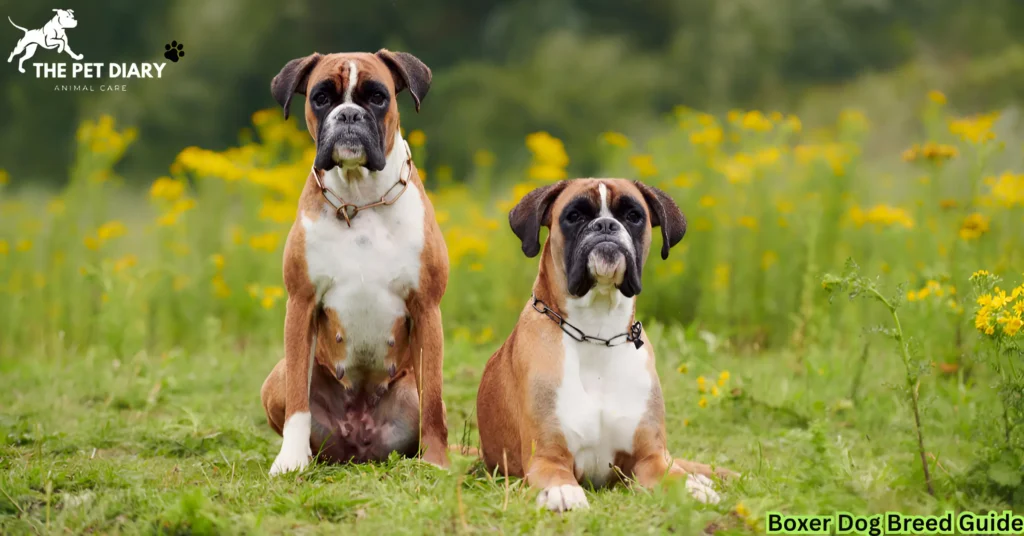Boxer dogs are one of the most popular breeds across the world, and for good reason. Known for their playful nature, protective instincts, and strong loyalty toward their families, Boxers have earned a reputation as both loving family pets and reliable working dogs. Their charming personality and distinctive appearance make them hard to ignore. The Boxer Dog Breed Guide is helpful whether you’re planning to adopt a Boxer, already own one, or are simply curious about boxer mix dogs like the pit and boxer mix dog, as it gives you everything you need to know.
In this blog, we’ll explore the Boxer’s history, traits, training needs, health concerns, lifestyle requirements, and even touch on practical aspects like using a dog litter box, choosing the right dog toy box, or signing up for a dog subscription box that suits your pup’s energy and chewing habits.
History & Origin of the Boxer
The late 19th century saw the birth of the Boxer breed in Germany. They were developed from the Bullenbeisser (a now-extinct mastiff-type dog) and the English Bulldog. Initially, Boxers were bred for hunting large game, but over time, they became popular as working dogs, performing roles like guarding, pulling carts, and even serving in military and police forces.
Their natural intelligence, strength, and alertness made them excellent watchdogs, but their affectionate personality also secured them a place inside family homes. Today, Boxers are primarily family companions and continue to be loved worldwide.
Physical Appearance & Traits
Boxers are medium to large-sized dogs with a muscular, athletic build.
-
Height: 21–25 inches (male), 20–23 inches (female)
-
Weight: 55–70 lbs (male), 50–65 lbs (female)
-
Coat: Short, smooth, and shiny
-
Colors: Fawn, brindle boxer dog, and white (sometimes with black mask or markings)
-
Lifespan: 10–12 years
Their strong jaws, expressive dark eyes, and square-shaped muzzle give them a bold but lovable look. Boxers are often described as “forever puppies” because of their playful behavior, even in adulthood.
Personality, Temperament & Boxer Dog Breed Guide:

Boxers are often called the clowns of the dog world due to their silly antics and playful personalities. They are highly social and thrive in families where they receive plenty of attention and affection.
-
Loyal: Fiercely protective of their family members.
-
Playful: Need lots of playtime and enjoy interactive toys.
-
Energetic: Daily exercise is a must. Otherwise, they can become restless.
-
Good with Kids: Their patience and protective nature make them wonderful around children.
-
Alert Watchdogs: They will bark at strangers but are not overly aggressive.
Boxers are extremely people-oriented dogs, so they don’t like being left alone for long periods.
Caring for a Boxer Dog Breed Guide:
Caring for a Boxer involves balancing their energy with their grooming and dietary needs.
Grooming:
Boxers have short coats that require minimal grooming. A weekly brushing is enough to keep their fur shiny and reduce shedding. Bathing once a month (or as needed) works well for them.
- Bathing: You can bathe your dog once a month, unless they manage to splash in a very muddy pond. Use a mild, dog-friendly shampoo at all times.
Brushing: To keep your Boxer’s coat healthy and manage mild shedding, brush them several times a week with a rubber curry brush or a grooming glove. - Dental care: tooth hygiene is crucial since boxers are brachycephalic, or flat-faced, and might occasionally have tooth problems. Brush their teeth daily with a vet-approved toothpaste like PetSmile Professional Toothpaste. Starting early will allow your Boxer puppy to become accustomed to the situation.
- Nail care: Boxers need their nails trimmed about once a month.
Exercise:
These dogs have high energy levels, so daily exercise is crucial. Long walks, runs, or playing fetch will help burn off their energy. A fenced yard is ideal. They also enjoy playing fetch and will love racing around the backyard if you have a safe, gated space.
Boxers are speedy. They can travel more than thirty miles per hour, making them one of the fastest dog breeds! So in unfenced locations, you’ll need to keep them on a strong leash.
Mental stimulation goes hand-in-hand (or paw-in-paw?) with exercise, and these clever pups need lots of it. Boxers love interactive toys and games, and they’re great at dog sports that challenge their minds, like flyball and agility trials.
Keep an eye out for symptoms of overheating when your Boxer runs around. This breed struggles to control its body temperature due to its flat muzzle; thus, it is your responsibility to keep it secure and cool.
Diet:
A high-quality, protein-rich diet is essential for maintaining their muscular build. Consult your vet to determine portion sizes and food type according to age and activity level.
Training a Boxer Dog & Breed Guide:

Boxers are intelligent but sometimes stubborn, so patience and consistency are key.
-
Start Early: Puppy training and socialization help prevent behavioral issues.
-
Positive Reinforcement: Reward-based training works best.
-
Mental Stimulation: Boxers love puzzle toys and games. A dog toy box filled with durable chew toys and interactive puzzles can keep them entertained.
-
Potty Training: Some owners successfully use a dog litter box indoors, especially for boxer puppies or apartment living. While not as common as outdoor training, it can be useful during bad weather or for senior dogs.
Health & Common Issues
Like many purebred dogs, Boxers are prone to certain health conditions.
The typical boxer dog lifespan is 10–12 years. Here are a few health concerns to consider.
- Aortic stenosis: Referring to a narrowing at the heart’s aortic valve, this condition is hereditary and often detected as a heart murmur during a routine physical exam. Your dog might not require therapy in mild cases. Medication may be required in mild to severe cases. Boxers with this condition should limit their exercise.
- Arrhythmogenic right ventricular cardiomyopathy (ARVC): Often referred to as Boxer cardiomyopathy, ARVC is a hereditary disease that can cause congestive heart failure or sudden death. Usually, it happens when a Boxer dog is about six years old.
- Gastric dilatation-volvulus (GDV) and bloat: Bloat occurs when food or air causes the stomach to expand. Occasionally, the stomach twists, preventing the organs’ blood flow. The signs of this condition, known as gastric dilatation-volvulus, include dry heaving, restlessness, and distension of the abdomen. See a veterinarian right away if you observe these symptoms. Bloat and GDV are life-threatening conditions.
- Brachycephalic obstructive airway syndrome. Boxers’ distinct facial structure makes it harder for them to breathe, leading to brachycephalic obstructive airway syndrome (BOAS). Keeping your Boxer at a healthy weight and avoiding extremes of temperature, both hot and cold, will help manage symptoms; in extreme cases, surgery may be necessary.
- Cancer: Boxers are at risk for hemangiosarcoma, an aggressive cancer that develops from blood vessels, as well as lymphosarcoma, osteosarcoma, and other tumors. Maintain your routine health examinations because early detection can significantly impact the results.
- Degenerative myelopathy: This is a neurological disease that affects the spinal cord; it causes problems with breathing, vocalizing, and eating, and it slowly weakens and then paralyzes the back legs. The progression may be slowed if you keep your dog active and at a healthy weight for as long as you can.
- Dental issues: A Boxer’s jawbone may occasionally be harmed by painful cysts that develop from their teeth. Another common condition is an underbite, which occurs when the upper jaw is shorter than it should be. The teeth will need to be extracted if the upper incisors dig into the lower jaw.
- Dilated cardiomyopathy: Dilated cardiomyopathy is a genetic condition where the heart enlarges, possibly resulting in heart failure. The diagnosis is made with an echocardiography, and daily medication is frequently used as treatment.
- Eye issues: Eye ulcers are a common condition in Boxers. Signs are extreme tearing, squinting, and redness. Take your Boxer to the veterinarian immediately if you think they may have an eye ulcer.
Hip dysplasia: When the hip and thigh bones’ ball and socket don’t fit together correctly, it causes a loose joint and, in the long run, arthritis in dogs. Surgery may be necessary in more severe cases; however, medicine, joint supplements, specific diets, weight management, or physical therapy are frequently used to address the problem. - Hypothyroidism: Common in Boxers, hypothyroidism includes symptoms like lethargy, hair loss, skin infections, ear infections, and weight gain. It can be identified by a blood test, and daily oral medicine is the treatment.
Regular vet visits, balanced nutrition, and exercise can help manage these risks.
Pro tip: Keeping a dog box or crate can help during recovery if your Boxer needs rest after an injury or surgery.
Boxer Mix Dog Breed Guide:
Many dog lovers also adore boxer mix dogs, as mixes often combine the Boxer’s playfulness with other breed traits.
Popular Boxer Mixes:
-
Pit and Boxer Mix Dog (Pitoxer): Strong, loyal, and energetic. This mix inherits the Boxer’s playfulness and the Pitbull’s determination, making it a protective but affectionate family pet.
-
Boxador (Boxer + Labrador): Friendly, energetic, and easy to train.
-
Bullboxer (Boxer + Bulldog): Stockier build, calmer personality.
-
Boxer + Husky: Intelligent, vocal, and full of energy.
Each mix has its own boxer temperament and needs, so always research carefully before adopting.
Lifestyle & Accessories for Boxers

Because Boxers are active, strong-jawed, and playful, certain accessories are almost essential.
-
Dog Box (Crate): A crate gives them a safe place to rest, reduces destructive behavior, and helps with house training.
-
Dog Toy Box: Boxers love to chew and play. A sturdy toy box filled with durable chew toys, ropes, and interactive puzzles helps prevent boredom and keeps your home organized.
-
Dog Litter Box: For owners in apartments, this can be a lifesaver during bad weather or when outdoor potty breaks aren’t possible.
-
Dog Subscription Box: Many services deliver monthly boxes filled with toys and treats tailored for strong chewers like Boxers. This keeps them happy, stimulated, and reduces the need to shop constantly for new toys.
Is a Boxer Right for You?
You might want a Boxer as your dog if:
-
You have an active lifestyle
-
You want a playful, loyal, and protective dog
-
You’re prepared for consistent training and socialization
-
You can give them plenty of attention and exercise
However, if you’re looking for a low-energy, independent dog, a Boxer might not be the best choice.
Conclusion of Boxer Dog Breed Guide:
Boxer dogs are loyal companions, energetic playmates, and excellent family protectors. With their expressive faces and goofy antics, they bring joy to every household they join. Whether you choose a purebred Boxer or one of the popular boxer mix dogs like the pit and boxer mix dog, you’re guaranteed a pet that will keep you entertained and loved. Equipped with the right care, training, and accessories like a dog toy box, dog litter box, or even a dog subscription box, your Boxer will thrive and live a happy, fulfilling life. Learn more at ThePetDiary.com.
If you’re ready for an active, affectionate, and slightly goofy companion, the Boxer dog might just be your perfect match.
❓ FAQS of Boxer Dog Breed Guide:
1. Are Boxer dogs good family pets?
Yes! Boxers are affectionate, playful, and protective, making them excellent companions for families with children.
2. How long do Boxer dogs live?
The average lifespan of a Boxer is 10–12 years, though proper diet, exercise, and regular vet care can help them live longer.
3. Do Boxer dogs need a lot of exercise?
Absolutely. Boxers are high-energy dogs and need at least 60–90 minutes of daily exercise, including walks, runs, and playtime.
4. Are Boxer dogs easy to train?
Boxers are intelligent but sometimes stubborn. Positive reinforcement and early training are key to success.
5. Do Boxers shed a lot?
They have short coats and are moderate shedders. Weekly brushing helps keep their coat healthy and reduces shedding.
6. Where can I get a Boxer Dog Breed Guide?
You can find a Boxer Dog Breed Guide on reputable dog-care websites, breed-specific books, or trusted sources like thepetdiary.


